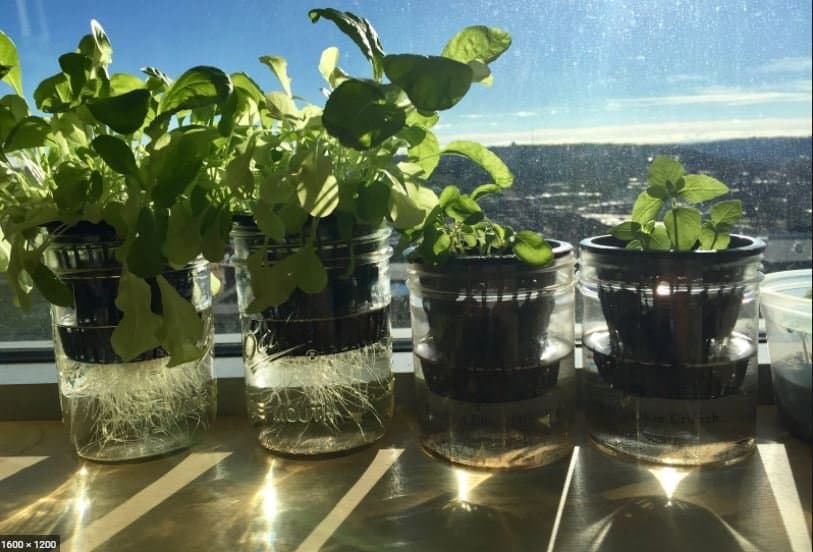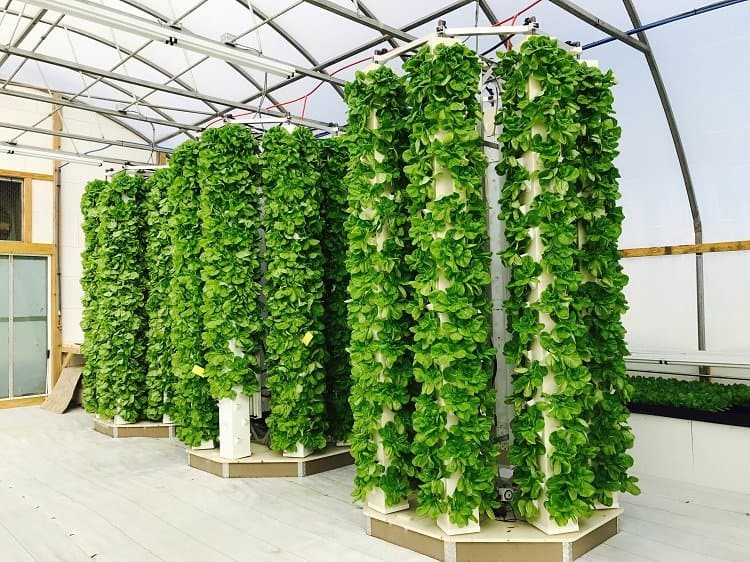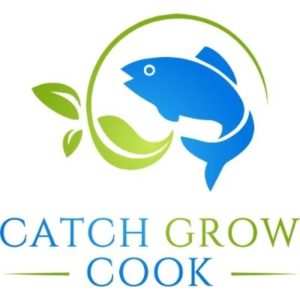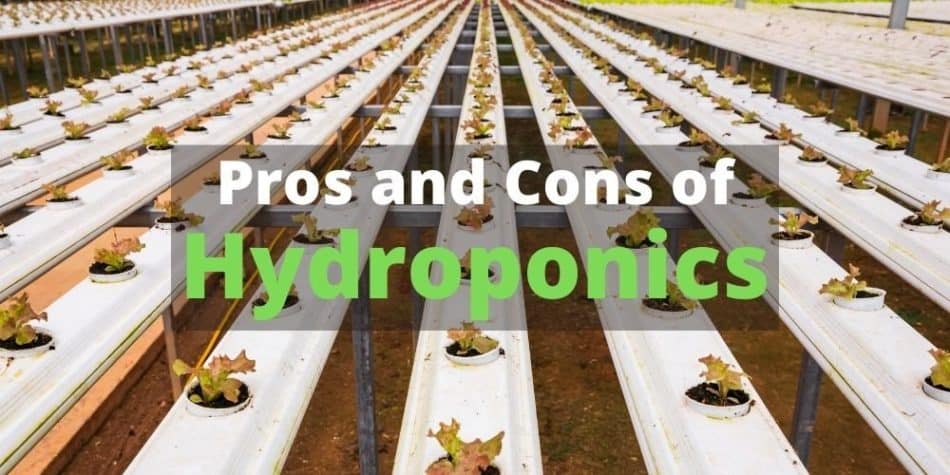Hydroponic gardening is a method of growing plants that has become more popular due to the shorter grow times and higher crop yields. These two benefits alone make hydroponic farming seem like an obvious solution to any food shortage. So why do we even grow plants in soil?
Fundamentally, hydroponic systems work without soil since a person is constantly supplying the plants with everything they need to grow. So the water, nutrients, and light all need to be provided to the plant.
In order to understand why hydroponic farming is not the only method for growing plants, we have compiled the advantages and disadvantages of hydroponic gardening vs soil.
Pros of Hydroponics
First we are going to quickly list the pros and cons of hydroponics and then explain each of the listed reasons down below.
- Hydroponic plants can be grown anywhere
- Plants can be grow year round
- Plants grow faster which means shorter time to harvest
- Can produce consistent higher yields of crops
- You can stack plants vertically meaning you can grow more in the same square footage space
- Higher water efficiency. Hydroponics uses 10 times less water than soil
- Complete control over nutrient balance for plants
- Little to no pesticides
- Reduces nutrient leaching into the environment
- Less labor. Hard tasks such as tilling, cultivating, fumigation and mulching not required for hydroponics
- Harvesting is easier
- Growing can be a relaxing hobby indoors or outdoors
- Reduces carbon footprint as you can grow at home. Commercial growers can now grow in urban environments such as a warehouses which means the food grows closer to the consumer.
Cons of Hydroponics
- The upfront cost of setting up hydroponics systems is higher than growing in soil
- More supervision is required (time and commitment)
- Mistakes and system malfunctions can damage or kill plants
- Hydroponic gardens can be affected by power outages
- Requires higher water quality
- Waterborne diseases can spread quickly
Reasons To Grow Hydroponically
Below we will explain each of the advantages of growing hydroponically.
Hydroponic Plants Can Be Grown Anywhere
A huge benefit to hydroponic gardening is that plants can grow anywhere. You can grow jalapenos outside in your garden, or indoors in your garage or windowsill.

As long as the plant is getting light, water, and nutrients then the plant will grow. This is the fundamental principle of hydroponics and why soil is not necessary for plants to grow.
Hydroponic Plants Can Be Grown Year Round
Another huge benefit of hydroponic gardening is being able to grow plants year round. There are many areas of the world where the climate limits the types of plants can be grown outdoors.
In cold regions, winter means vegetable and fruit plants cannot be grown and must be purchased from the store. However, with hydroponics you can still grow your own produce even during a snowy winter.
By growing your plants in a climate controlled area such as your closet, garage, or even a windowsill in your bedroom, you can grow plants year round. Now you can have tomatoes growing in the middle of winter whereas before all the plants would die outside.
Hydroponic Plants Grow Faster Which Means Shorter Time To Harvest
Hydroponic plants have been shown to grow faster than the same plant grown in soil. The reason why hydroponic plants grow faster is because the nutrients are water soluble which is the easiest for the plants to consume and use to grow.
In soil, you are not necessarily watering the plants. You water the ground which is where the roots drink both the water but also feed by slowly absorbing nutrients from the soil.
Hydroponics speeds up this process as you place the plant’s roots in nutrient solution water so the plant has everything it needs to grow.
As plants grow faster they will start fruiting faster and be ready for harvest quicker. This is another great benefit to hydroponic gardening versus soil growing.
Hydroponic Gardening Can Produce Consistent Higher Yields Of Crops
Hydroponic plants have been shown to not only grow faster but also produce higher yields of crops than the same plant grown in soil. The reason for higher yields is due to the water soluble nutrients that are easily absorbed by the plant’s roots.
Since the plant can easily get all the nutrients it needs at anytime, the plant is not restricted in its growth and development of its produce.
Plants that are grown in ground must slowly absorb the nutrients from the soil which means the yield of the crops will be lower than hydroponic plants.
Hydroponic Plants Can Be Stacked Vertically
When planting a garden outdoors, the plants must be planted into the ground and spread out horizontally. With hydroponics, you can grow plants both horizontally and vertically.
For example, in the aeroponics towers down below you can see that these 3 towers take up more space vertically than they do horizontally. Normally all the vertical space in this greenhouse would be wasted but now that space can be utilized to grow more plants.

In many cases, you can grow 2x to 20x more plants in the same horizontal space in hydroponics than you could in soil. This means instead of getting 1 head of lettuce, you could be growing 2 to 20 heads of lettuce!
Hydroponics Is More Water Efficient Than Growing In Soil
Hydroponic gardening seems like it would use more water since the plants are literally growing in a water solution. However, hydroponic gardening has been shown to be far more water efficient than growing plants in soil.
In fact, hydroponics has been proven to use as much as 10 times less water than traditional field crop watering methods.
When plants in soil are watered, a lot of that water evaporates or runs off and doesn’t even water the plant. In hydroponics, the water is reused in the system so if the plant doesn’t drink the water the first time then it gets placed back into the water reservoir.
Hydroponic Gardening Offers Complete Control Over Plant Nutrients
Since you must provide all the water and nutrients to your plants in hydroponics, this means you have complete control over your plant’s nutrients. This is a great benefit since you can provide higher levels of specific nutrients at different times of the plant’s life.
For example, tomato plants can use more nitrogen when they are growing to produce more foliage. However, if the tomato plant isn’t fruiting then adding more phosphorous can help the plant produce more tomatoes.
It is very easy to create completely new nutrient solutions in a water jug, ensure you have the right ratios of more nitrogen vs phosphorous, and add this nutrient solution to your hydroponic plants. This level of control is impossible to have with soil grown plants as the soil will always provide some level of nutrients.
Little To No Pesticides Needed For Hydroponic Gardens
Hydroponic gardening does not require soil which comes with a huge advantage – less pests! This means you likely will not have slugs or aphids attacking your hydroponic plants if you grow them indoors. Less pests means you will not need to spray your plants with any pesticides.
So if you’re looking to grow plants and not use any pesticides than give hydroponic gardening a try!
Reduces Nutrient Leaching Into The Environment
Hydroponic systems are fully contained meaning that there is no water going to or from the system into the ground. So if the hydroponic system was filled with battery acid instead of water, the nearby ground would not get contaminated with this battery acid.
Instead you could simply dispose of the harmful waste without harming your land or the nearby environment.
Nutrient leaching is common with large commercial soil farming. As soil farmers fertilize their ground, spray their crops with pesticides or herbicides, all of these chemicals can leach from their farm into the waterways. This means the nearby river or pond can get contaminated with chemicals which can harm the environment.
It is not uncommon to see animals and fish get damaged or die from factory farming runoff. This reason alone makes hydroponic gardening a much safer alternative for the environment.
Hydroponic Gardening Requires Less Labor Than Soil Gardening
A great benefit for most gardeners is that hydroponic gardening requires less labor than growing plants in soil. In soil gardening you need to till the soil, spread mulch over the ground, remove weeds, resolve any pests, and so on. All of this is laborious and gets more difficult as you grow more plants.
On the other hand, hydroponic systems only need to have clean water, sufficient nutrient levels, and light. As long as the plants have these three things than the hydroponic systems will work properly. Now some systems also need electricity but this isn’t needed for all systems.
Overall, hydroponic systems are easier to grow plants, maintain the systems, and harvest the produce. Soil gardening requires a lot of extra work to ensure that the plants grow as big as they can without weeds or pests getting in the way.
Harvesting Is Easier In Hydroponics
Another benefit to hydroponic gardening is that harvesting is easier. Due to hydroponic systems allowing plants to grow in compact areas means you can harvest a lot of plants without having to move very far.
Hydroponic systems are also usually not on the ground since you need to have a water reservoir somewhere. So at the minimum height, the plants are usually a foot off the ground making it easier to reach for the plants without fully bending over or kneeling.
Hydroponic Growing Is A Relaxing Hobby Indoors and Outdoors
Hydroponic gardening is a relaxing hobby once your system is properly setup. Similar to growing houseplants, you simply checkup on your plants every so often to see how they’re doing.
You might do occasional maintenance such as fill up the water level or create a new nutrient solution. There isn’t a lot of heavy lifting needed to keep your plants growing which makes this a relaxing activity.
Remember, you will never have to weed your hydroponic garden since pesky weeds cannot grow hydroponically. You also won’t have to deal with many pests, if any at all, since hydroponic gardens only have a few insects that can harm your plants.
Hydroponic Gardening Reduces Carbon Footprints
Hydroponic gardening has a great long term benefit over soil growing which is reducing the carbon footprint of produce.
Plants that are grown on farms need to get harvested and shipped to stores before the consumer can eat them. This means a tomato must first be picked from the plant, transported to a packing facility, be placed on a truck, and delivered to a grocery store. From there a person purchases the tomato and transports it home to cook.
That’s a lot of steps to just take a tomato from a plant to be eaten.
Plants that are grown at home hydroponically help reduce the carbon footprint. Now plants grown in the soil at home have the exact same benefit.
Commercially hydroponic setups are where the carbon footprint gets much smaller compared to commercially grown soil plants. Hydroponic plants can grow in urban areas such as rooftops or warehouses which means a tomato can be grown a few streets down from the grocery store. This reduces the amount the produce needs to travel which reduces the carbon footprint.
Reasons Not To Grow Hydroponically
Now that we’ve covered the advantages to grow hydroponically, we’ll cover the disadvantages to growing hydroponics.
High Upfront Cost Of Hydroponic Systems
Hydroponic systems have a higher upfront cost than growing in soil. Depending on the system you’re looking at, you will need to purchase PVC pipes, water pumps, air pumps, growing medium, and nutrients. All of this is not needed when you simply plant a seed in the ground.
However, once you have setup your hydroponic system, you will likely not need to replace anything to grow another plant. So the system gets cheaper over time as you won’t be purchasing new things besides nutrients.
More Time and Commitment Needed
Hydroponic gardening does require more consistent time and commitment versus soil growing. Now there are some methods such as the Kratky Method that does not require any time or commitment as the plant is growing.
However, most hydroponic systems require occasional checkups. This way you can ensure that the water or air pumps are still running and that the water has enough nutrients for the plants to continue growing.
If you enjoy gardening then this won’t be a disadvantage but just wanted to list this here in case you wanted to grow plants with the least amount of effort.
Hydroponic Gardens Can Be Affected By Power Outages
Hydroponic systems that use air or water pumps need electricity. This means if there’s a power outage then your entire system will not work properly so your plants can get damaged or die.
There are some hydroponic systems that do not require electricity such as the Kratky Method or the Wick System so there are ways around this disadvantage.
Requires Higher Water Quality
Hydroponics relies on water and nutrients to grow the plants. This means you cannot use low quality water.
In most parts of the USA, you can use tap water for hydroponics. You might need to let it sit out so that the chlorine can evaporate and you might need to add some nutrients to the water. But overall, tap water will not kill your plants in hydroponic systems.
As a rule of thumb, if you could reasonably drink the water then the plants will be able to drink the water as well.
Waterborne Diseases Can Spread Quickly
Waterborne diseases can affect and damage or kill hydroponic plants since they are growing in water.
Some systems have multiple plants growing from the same water reservoir so this is where the waterborne disease can spread rapidly. However, some hydroponic systems will only have one or a few plants per water reservoir which reduces this threat.
Waterborne diseases is a true disadvantage to hydroponics compared to soil gardening where these almost never spread.
Weighing up the Pros and Cons of Hydroponics
When you look at the advantages and disadvantages of hydroponic systems, the negatives can be seen as more of a quirk than a reason to not try it.
Hydroponic systems can cost as much as you want to spend, but on a small scale, you can set up a system for next to nothing. In fact, many people will DIY built their own systems from everyday materials such as 5 gallon buckets.
Once you get started with hydroponics, you will find plants that thrive in hydroponics versus ones that are more challenging. You’ll also start to see the advantages of your system versus the disadvantages your system has over soil gardening.
As long as you have an interest, you will find a hydroponic system that works for your budget and gardening expertise.

